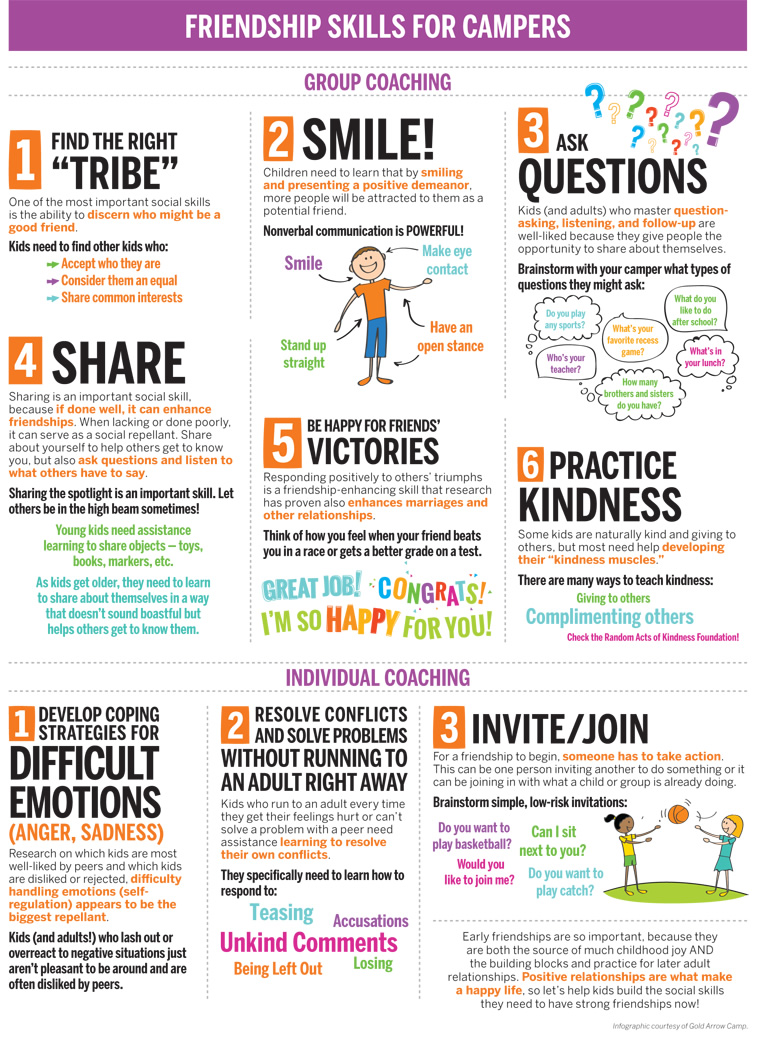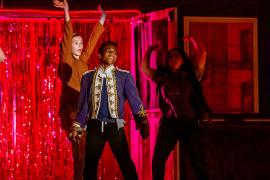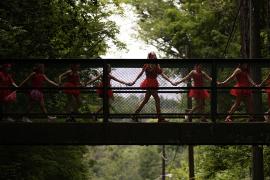"Make new friends, but keep the old. One is silver and the other's gold." — Girl Scout song based on a poem by Joseph Parry
The classic campfire song "Make New Friends" reminds us that our friends are treasures. Research in the field of positive psychology supports the conclusion that these important relationships are, in fact, much more valuable than any precious metal or material wealth. Our friendships are not only good for our health; they are also the key to a happy life. And what is the best predictor of positive relationships? Good social skills.
Because of the ideal social setting at camp, parents and counselors often assume that all kids are going to automatically reconnect with old friends and make new ones when they arrive. However, this is not always the case; some kids will not make or keep their camp friendships without assistance. In recent years, cultural trends including decreased free-play time, more screen use, and more isolated families have led to unprecedented social skills deficits in some children. Some of these kids, those who struggle most with making and keeping friends, will be in your cabin groups and activities this summer. They will arrive at camp lacking some basic face-to-face skills. As a camp counselor, you have the incredible power to not only provide your campers with a fun and safe experience, but also teach them better friendship skills. Know that by coaching your campers to better social interaction, you are most likely having a positive, lifelong impact on their overall happiness and well-being.
As with every other skill we teach our campers, it's important we keep a growth mindset — the idea that talents can be developed through hard work — about social skills. Thirty years ago, when I first started working at camp, we'd use fixed-mindset statements like, "Oh, he's just a little awkward" or, "She's just really shy," and we would work around their social awkwardness by pairing them with someone more outgoing or volunteering to be their partner at canoeing.
Today, it's critical that we go into the summer knowing that our campers can improve their social skills, even during their short stay with us. The first step toward helping your campers develop better social aptitude is to start thinking of yourself as a "social skills coach."
Regardless of the skill, remember that leading by example in your interactions with campers and other members of the camp community will be your most powerful coaching tool.
Group Coaching Social Skills
One: Find the Right "Tribe"
At my camp, one of our core values is "Be You." We want our campers to embrace being themselves and learn to explore and express their own interests without concern for what other people might think. Many campers talk about camp being a "judgment free" zone where they can "be themselves," and we encourage a culture where kids respect differing ideas and opinions and treat each other kindly. An important social skill is the ability to discern who is being a good friend and what a supportive friend group feels like. By creating a cabin group culture where each member is valued for who they are and treated with respect, your campers may experience a feeling of acceptance and belonging unlike anything they've encountered before. Camp offers an excellent opportunity for campers to understand how it feels to be part of a good "tribe" of friends where acceptance is unconditional. In this way, you can help positively impact your campers' future friendship decisions.
Coaching Ideas:
- Lead a discussion with your campers about what makes a good friend. Set up guidelines for how you are going to treat each other with respect and be good friends to each other. Include ideas like listening to each person when he or she is talking. Consider using a "talking stick" or other object to remind kids during these conversations that if they don't have the stick, they need to be looking at and listening to the per - son talking.
- Have regular times when you lead discussions where each camper shares while the others listen. This can be a "question of the day" that each camper answers, or sharing of "highs and lows" at the end of the day. While most of the time campers' conversations will develop organically, it's important that some discussions are counselor-led and more organized. Otherwise, you may have some campers who end up dominating conversations and others who won't join at all.
- Share a story of your own (if you have one) about trying to fit in to a social group where you weren't treated well and how you eventually discovered your tribe.
Two: Smile!
Our nonverbal communications are powerful. Teach your campers that smiling, standing up straight, making eye contact, and having an open stance when talking to others all contribute to others naturally perceiving them as friendly and approachable. Kids who think other kids are being mean or leaving them out often aren't aware of how others perceive their own demeanor. Children need to learn that by smiling and presenting a positive disposition, more people will be attracted to them as potential friends.
Coaching Ideas:
- Try playing body-language charades with your campers. On index cards, write different emotions (one per card), such as happy, sad, angry, tired, frustrated, surprised, scared, etc. Have campers take turns drawing a card and acting out the emotion while the rest of the group tries to guess what it is. Debrief about how, without saying a word, we interpret how people are feeling.
- For older kids, you can lead a discussion about times when they misunderstood a situation or felt misunderstood by others because of body language. Adolescents are often comfortable sharing what they believe people incorrectly think of them. This offers a teachable opportunity to brainstorm how to make your body language match who you really are.
- Have cabin group "challenges" centered on being friendly around camp. For example, you could challenge your group to smile and greet each kitchen staff member. Debrief afterwards about how people reacted to the positive interactions. Often children do not realize how much power they have to create a positive connection.
Three: Ask Questions and Listen
People love to talk about themselves, so asking good questions is often the entry point for building friendships. Some kids don't know how to ask good questions and listen well, so you can help them tremendously with this skill.
Coaching Ideas:
- Do a "Paired Share" activity within your cabin group. Give the campers a topic or question to answer and let them know that each person speaks for one full minute, without interruption, while the partner listens. Time the interaction, then have them switch and give the other person the chance to talk. Talk about how it felt to have someone staring and listening without talking.
- Have each of your campers write a question they'd like to have other campers answer. Put the questions in a hat (read through and take out any inappropriate ones) and pull them out at meals, downtimes, or campfires. Have each camper answer the question while others listen. You can offer examples based on their age to spur them on, such as "What are your hobbies?" or "How many brothers and sisters do you have?"
Four: Share Appropriately
Sharing is an important social skill because, if done well, it can enhance friendships. When lacking or done poorly, it can serve as a social repellant. Young kids need assistance learning to share objects, such as toys, books, and markers. As they get older, kids need to learn to share about themselves in a way that doesn't sound boastful but helps others get to know them.
Coaching Idea:
As with many of these skills, facilitated cabin group discussions and activities will go a long way in helping campers learn to share. Consider spotlighting a different camper for each day of the session. That camper shares a story or talks about him or herself, and the other campers then ask him or her questions. Each camper has a turn, and they all have a chance to share about themselves and learn about each other. Make sure campers know any topic that could upset other kids needs to be cleared with the counselor first. As kids get older, the topics covered can be more intense, but it's important not to let sharing become a time when difficult topics that would be more appropriately discussed one-on-one with a counselor pop up in a group setting.
Five: Be Happy for Friends' Victories
Responding positively to others' triumphs is a friendship-enhancing skill. If you can truly be as happy and excited for your friend's victory as you would for your own, that's an excellent relational skill. Many of your campers will be stuck in the competitive mode that our school and sports cultures strongly encourage, so learning how to celebrate friends' victories is an important skill for them to develop.
Coaching Ideas:
- Make it the norm in your group or activity to encourage and support each other. Model giving loud cheers and high fives to kids who've mastered a new skill.
- Have a compliment time when kids can share positive things they've seen others do or accomplish at camp. These can be verbal or written.
Six: Practice Kindness
Kind people attract friends. For some kids, kindness and thinking about others come naturally, but most kids need help developing their "kindness muscles." Kindness is something that is learned by practice, so a great way to coach your campers to be kind is to have them do kind acts.
Coaching Ideas:
- "Secret Kindness Buddies" is an activity that can be done for one day, one activity period, or any other length of time. Campers pull a name from a hat and are assigned to be extra kind to that person for whatever time period you designate. At the end of the day, see if kids can guess who their secret kindness buddy was. Talk about and share what kind things were said and done.
- Encourage your campers to practice kindness throughout camp. Can your group do a chore for another group? Leave a cheerful note on the bathroom mirror? Write a thank-you note to someone on the support staff? Do a thank-you cheer after an activity? Serenade someone with a song? The opportunities for small acts of kindness at camp are endless. Brainstorm with your campers and try to do at least one kind act a day for the whole session. Not only will your campers enjoy doing the acts of kindness, but they will see the positive results of kindness in how people respond to them and be encouraged to continue practicing kindness after they get home.
Individual Coaching on Social Skills Deficits
The preceding social skills are great ones to introduce, coach, and practice in a group setting. However, campers with the most pronounced social skills deficits will likely need some individual coaching. The following skills require one-on-one coaching in most cases; but if you see a trend in your cabin, they could also be covered in a group setting.
Most kids who have problems making and keeping friends have deficits in more than one social skill, but you will be most effective as their coach if you focus on one specific skill in your individual coaching (and hopefully let them learn from and glean information from the additional group coaching as well). The social skill you focus on is likely to be one of the following three, which are areas in which many socially rejected kids need to improve.
One: Self -Regulation — Develop Coping Strategies for Dealing with Difficult Emotions
In research on which kids are most well-liked by peers and which are disliked or rejected, difficulty handling emotions (lack of good self-regulation) appears to be the biggest repellant. Kids (and adults) who lash out, misunderstand, or overreact to negative situations just aren't pleasant to be around. Therefore, it is vital that kids who struggle with regulating their emotions learn to handle difficult situations in a constructive way. This is probably the hardest skill to coach during a short camp stay, but there are definitely tools you can provide individual campers.
Two: Resolve Conflicts and Solve Problems Without Running to an Adult Right Away
Kids who run to an adult every time they get their feelings hurt or can't solve interpersonal problems on their own need assistance learning to resolve conflicts. Because they are away from their parents (who may be stepping in a bit too soon), their time at camp offers an ideal opportunity for kids to learn some conflict-resolution skills. Specifically, campers need to learn how to respond to teasing, unkind comments, losing, accusations, being left out, and peer pressure. Reviewing different ways to resolve conflicts and solve problems can help kids learn important life and relationship skills.
Coaching Ideas:
(Note: Lack of emotional self-regulation and poor conflict-resolution skills often go handin-hand, so many of the same coaching strategies can be used for both deficits.)
- Designate a cabin "chill spot." Create a safe place, one that is especially appealing or comfortable, within eye and earshot of your living area, where campers and counselors can go to regroup. Demonstrate using the space yourself so that it has positive connotations. Put some items there that might be relaxing — coloring supplies, a book, a stress ball, a deck of cards. It's best to establish and introduce this chill spot at the beginning of the session so campers who struggle with self-regulation won't feel singled-out or punished. When an outburst occurs, remind the camper about the chill spot and let him or her know you want to talk when he or she is feeling calm. No good outcome will result from talking with your camper when either of you is upset or emotionally fragile. Don't attempt to coach until both of you are calm.
- During your one-on-one coaching session (out of earshot of other campers), follow some or all of these steps. Remember, you want the camper to do most of the thinking and talking, so focus on open-ended questions. Lectures don't work.
- Ask how he or she was feeling and what happened to precipitate the outburst.
- Ask how he or she will handle the situation differently next time.
- Review how he or she can apologize (resource available here: http:// sunshine-parenting.com/2016/ 09/30/more-than-im-sorry).
- Ask for ideas about how he or she has been able to calm down in difficult situations (resource available here: http://sunshineparenting.com/2016/10/17/10- ways-teach-kids-calm).
- Come to an agreement about what the camper will do the next time he or she is upset.
- Agree to a follow-up time and express confidence in his or her ability to react more calmly next time.
IMPORTANT NOTE: Seek support from your supervisor or camp director if coaching is not effective in improving the camper's behavior. If other campers are endangered or their experience is being marred by one camper's behavior, seek help immediately.
Three: Invite/Join
For a friendship to begin, someone has to take action. This can mean inviting another child to do something, or it can mean asking to join in with what a child or group is already doing. Ample opportunities exist at camp for kids to invite friends into low-risk activities like playing cards, signing up for an activity together, or being buddies for a trip to the bathroom. There are also many opportunities to ask to join into an activity. Campers who struggle with making friends may not have mastered the art of inviting and/or joining.
Coaching Ideas:
- With a camper who has a "joining" problem (trying to join a game in progress, annoying other campers), find an opportunity for a coaching session and offer some guidance. Ask how he or she feels when he or she is in the middle of a game and someone else wants him or her to stop and start the game over. Roleplay different ways of asking to join and take turns playing both the joiner and the one being asked to join. Suggest that the camper ask, "Hey, can I play the next game?" rather than intruding at the midway point.
- A camper who has an "inviting" problem will often complain no one likes him or her. Find a one-to-one opportunity to brainstorm small invitations the camper could extend. You can even suggest campers who might be receptive to invitations. Do some role-playing, challenge the camper to make an invitation, and follow up with praise.
Remember Why You're Here
Clinical psychologist Russel Barkley, PhD, said, "The children who need love the most will always ask for it in the most unloving ways" (2013).
Midway through the summer, you may find yourself incredibly annoyed with a difficult camper who is really making your life challenging. It may be helpful to circle back to the enthusiasm you have now, at the start of the summer, about changing kids' lives for the better. Becoming your challenging camper's social skills coach, and helping with even a small improvement, may be the most impactful thing you do this summer. Friendships are so important for our campers because they are both the source of much childhood joy and the building blocks for later adult relationships. Positive relationships are what make a happy life, so let's help our campers build the social skills they need to have strong friendships now and in the future.

Reference
Barkley, R. (2013). Taking charge of ADHD: The complete, authoritative guide for parents, third edition. New York, NY: The Guilford Press.
Audrey "Sunshine" Monke, MA, with her husband Steve, has owned and directed Gold Arrow Camp (Lakeshore, California) for the past 29 years. She has been a member of ACA since 1989 and was president of the Western Association of Independent Camps (WAIC) from 2007–2010. Audrey's book, Happy Camper: Parenting Secrets from 30 Years of Summer Camp, will be published in 2018. Visit her website at sunshine-parenting.com/ happy for more information.




